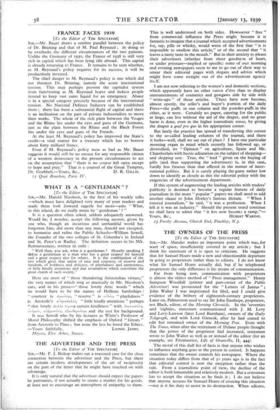FRANCE FACES 1939
[To the Editor of THE SPECTATOR] SIR, Mr. Bauer draws a sombre parallel between the policy of Dr. Bruning and that of M. Paul Reynaud ; in doing so he overlooks the different circumstances of the two patients. Unlike the Germany of 193°, the France of 1938 is still very rich in capital which has been lying idle abroad. This capital is already returning to France. It remains to be seen whether, as M. Reynaud's policy requires for its success, it will be productively invested.
The chief danger to M. Reynaud's policy is one which did not threaten Dr. Bruning, namely the acute international tension. This may perhaps prevent the capitalist system from functioning as M. Reynaud hopes and induce people instead to keep vast sums liquid for an emergency. Alsace is in a special category precisely because of the international tension. No National Defence Industry can be established there ; there has been a substantial flight of capital and there is an inclination on the part of private industrialists to move their works. The whole of the rich plain between the Vosges and the Rhine lies under the eyes and guns of the Germans, just as the plain between the Rhine and the Black Forest lies under the eyes and guns of the French.
At the least M. Reynaud's policy has improved the State's credit—a vital matter for a treasury which has to borrow about forty milliard francs.
Even if M. Reynaud's policy were as bad as Mr. Bauer suggests it would still be no excuse for any responsible citizen of a western democracy in the present circumstances to act on the assumption that " there is no course left open except to hope and pray." That is a counsel of the Great Tempter, Dr. Goebbels.—Yours, &c., D. R. GauE. Quai Bourbon, Paris IV.






































 Previous page
Previous page